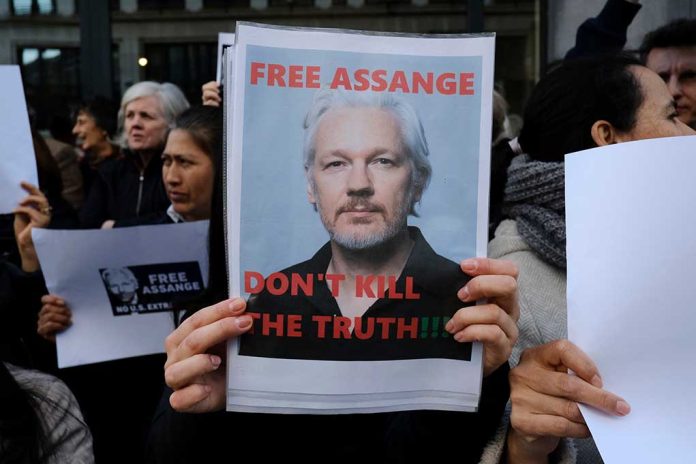
Julian Assange is set to make his highly anticipated first public appearance since his release from Belmarsh Prison.
At a Glance
- Julian Assange, founder of WikiLeaks, will address the Council of Europe next week.
- This will be his first public appearance since being freed from a British jail.
- He will provide testimony on October 1st in Strasbourg.
- Assange returned to Australia in June after a plea deal with the U.S. Department of Justice.
- PACE has recognized Assange as a political prisoner who faced severe conditions during his detention.
Assange to Address PACE Following Release
Following his release from Belmarsh high-security prison, Julian Assange, the founder of WikiLeaks, is scheduled to address the Council of Europe next week. Assange will make his first public appearance by providing crucial evidence to the Parliamentary Assembly of the Council of Europe (PACE) in Strasbourg on October 1. This appearance holds significant importance as the PACE has recognized Assange as a political prisoner who faced severe conditions during his detention.
Assange’s upcoming address comes after he reached a plea agreement with the United States Department of Justice, in which he admitted to one felony count under the Espionage Act. This deal was instrumental in securing his release from prison. Assange will testify before the Committee on Legal Affairs and Human Rights, shedding light on his long period of imprisonment and the broader implications of his case.
PRESS RELEASE:
Julian Assange to Address Council of Europe Following Confirmation of his Status as a Political Prisoner
On October 1, Julian Assange will arrive in Strasbourg to give evidence before the Committee on Legal Affairs and Human Rights of the Parliamentary Assembly…
— WikiLeaks (@wikileaks) September 24, 2024
Details of Assange’s Testimony
Julian Assange’s testimony on October 1 will cover various aspects of his detention and its impact on human rights and press freedom. The report on his detention highlights several fundamental issues, including the call from PACE for the U.S. to investigate potential inhumane treatment he endured. Thorhildur Sunna Avarsdottir, the report’s author, emphasized Assange’s case as a high-profile example of transnational repression.
“The report confirms that Assange qualifies as a political prisoner and calls on the UK conduct an independent review into whether he was exposed to inhuman or degrading treatment. The report discusses how governments employ both legal and extralegal measures to suppress dissent across borders, which poses significant threats to press freedom and human rights.”
During his time in prison, Assange spent a considerable period, including time in solitary confinement, at Belmarsh high-security prison. Assange’s wife, Stella, has mentioned that he is still recovering and needs time to “rediscover freedom” after years of confinement.
Background of Assange’s Legal Struggles
The legal action against Julian Assange began in 2010 after WikiLeaks published leaked documents detailing various aspects of the Afghanistan and Iraq wars. U.S. prosecutors claimed these leaks endangered lives, prompting a criminal investigation under the Espionage Act. Assange has consistently denied any wrongdoing and remained a contentious figure throughout his legal battles.
“Julian will be in Strasbourg next week on October 1st. It will be an exceptional break from his recovery as @COE invited Julian to provide testimony for the … Committee’s report into his case and its wider implications,” said Stella Assange, Julian’s wife, on X.
Assange’s case has raised critical concerns over press freedom and human rights. Supporters argue that he exposed U.S. military wrongdoing, while U.S. authorities claim his actions compromised national security. WikiLeaks’ revelations included reports on civilian casualties in Afghanistan and Iraq, and a U.S. airstrike in Baghdad that killed two Reuters journalists and other civilians.
Julian Assange is set to address the human rights organization Council of Europe next week in a first public appearance since being freed from a British jail, WikiLeaks said.https://t.co/JIOeM4puI3
— POLITICOEurope (@POLITICOEurope) September 25, 2024
Conclusion: A Landmark Address in Strasbourg
Julian Assange’s testimony before the Council of Europe marks a pivotal moment in his long legal saga. It underscores his controversial journey from the Ecuadorian Embassy to Belmarsh Prison, and now as a free man addressing significant human rights issues. This landmark appearance is expected to resonate well beyond Strasbourg, raising important questions about press freedom, human rights, and governmental accountability.
“JULIAN ASSANGE will address the Council of Europe next week to give evidence following a report highlighting the implications of his detention on human rights and the freedom of journalism.”
Assange’s experience serves as a stark reminder of the ongoing struggle for free speech and transparency in the face of governmental power. His address is anticipated to foster a deeper understanding and reflection on these critical issues.







